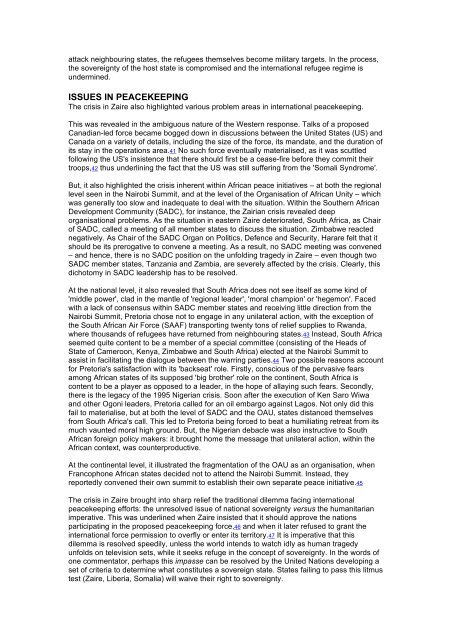some reflections on the crisis in zaire - Institute for Security Studies
some reflections on the crisis in zaire - Institute for Security Studies
some reflections on the crisis in zaire - Institute for Security Studies
Create successful ePaper yourself
Turn your PDF publications into a flip-book with our unique Google optimized e-Paper software.
attack neighbour<strong>in</strong>g states, <strong>the</strong> refugees <strong>the</strong>mselves become military targets. In <strong>the</strong> process,<br />
<strong>the</strong> sovereignty of <strong>the</strong> host state is compromised and <strong>the</strong> <strong>in</strong>ternati<strong>on</strong>al refugee regime is<br />
underm<strong>in</strong>ed.<br />
ISSUES IN PEACEKEEPING<br />
The <strong>crisis</strong> <strong>in</strong> Zaire also highlighted various problem areas <strong>in</strong> <strong>in</strong>ternati<strong>on</strong>al peacekeep<strong>in</strong>g.<br />
This was revealed <strong>in</strong> <strong>the</strong> ambiguous nature of <strong>the</strong> Western resp<strong>on</strong>se. Talks of a proposed<br />
Canadian-led <strong>for</strong>ce became bogged down <strong>in</strong> discussi<strong>on</strong>s between <strong>the</strong> United States (US) and<br />
Canada <strong>on</strong> a variety of details, <strong>in</strong>clud<strong>in</strong>g <strong>the</strong> size of <strong>the</strong> <strong>for</strong>ce, its mandate, and <strong>the</strong> durati<strong>on</strong> of<br />
its stay <strong>in</strong> <strong>the</strong> operati<strong>on</strong>s area.41 No such <strong>for</strong>ce eventually materialised, as it was scuttled<br />
follow<strong>in</strong>g <strong>the</strong> US's <strong>in</strong>sistence that <strong>the</strong>re should first be a cease-fire be<strong>for</strong>e <strong>the</strong>y commit <strong>the</strong>ir<br />
troops,42 thus underl<strong>in</strong><strong>in</strong>g <strong>the</strong> fact that <strong>the</strong> US was still suffer<strong>in</strong>g from <strong>the</strong> 'Somali Syndrome'.<br />
But, it also highlighted <strong>the</strong> <strong>crisis</strong> <strong>in</strong>herent with<strong>in</strong> African peace <strong>in</strong>itiatives – at both <strong>the</strong> regi<strong>on</strong>al<br />
level seen <strong>in</strong> <strong>the</strong> Nairobi Summit, and at <strong>the</strong> level of <strong>the</strong> Organisati<strong>on</strong> of African Unity – which<br />
was generally too slow and <strong>in</strong>adequate to deal with <strong>the</strong> situati<strong>on</strong>. With<strong>in</strong> <strong>the</strong> Sou<strong>the</strong>rn African<br />
Development Community (SADC), <strong>for</strong> <strong>in</strong>stance, <strong>the</strong> Zairian <strong>crisis</strong> revealed deep<br />
organisati<strong>on</strong>al problems. As <strong>the</strong> situati<strong>on</strong> <strong>in</strong> eastern Zaire deteriorated, South Africa, as Chair<br />
of SADC, called a meet<strong>in</strong>g of all member states to discuss <strong>the</strong> situati<strong>on</strong>. Zimbabwe reacted<br />
negatively. As Chair of <strong>the</strong> SADC Organ <strong>on</strong> Politics, Defence and <strong>Security</strong>, Harare felt that it<br />
should be its prerogative to c<strong>on</strong>vene a meet<strong>in</strong>g. As a result, no SADC meet<strong>in</strong>g was c<strong>on</strong>vened<br />
– and hence, <strong>the</strong>re is no SADC positi<strong>on</strong> <strong>on</strong> <strong>the</strong> unfold<strong>in</strong>g tragedy <strong>in</strong> Zaire – even though two<br />
SADC member states, Tanzania and Zambia, are severely affected by <strong>the</strong> <strong>crisis</strong>. Clearly, this<br />
dichotomy <strong>in</strong> SADC leadership has to be resolved.<br />
At <strong>the</strong> nati<strong>on</strong>al level, it also revealed that South Africa does not see itself as <str<strong>on</strong>g>some</str<strong>on</strong>g> k<strong>in</strong>d of<br />
'middle power', clad <strong>in</strong> <strong>the</strong> mantle of 'regi<strong>on</strong>al leader', 'moral champi<strong>on</strong>' or 'hegem<strong>on</strong>'. Faced<br />
with a lack of c<strong>on</strong>sensus with<strong>in</strong> SADC member states and receiv<strong>in</strong>g little directi<strong>on</strong> from <strong>the</strong><br />
Nairobi Summit, Pretoria chose not to engage <strong>in</strong> any unilateral acti<strong>on</strong>, with <strong>the</strong> excepti<strong>on</strong> of<br />
<strong>the</strong> South African Air Force (SAAF) transport<strong>in</strong>g twenty t<strong>on</strong>s of relief supplies to Rwanda,<br />
where thousands of refugees have returned from neighbour<strong>in</strong>g states.43 Instead, South Africa<br />
seemed quite c<strong>on</strong>tent to be a member of a special committee (c<strong>on</strong>sist<strong>in</strong>g of <strong>the</strong> Heads of<br />
State of Camero<strong>on</strong>, Kenya, Zimbabwe and South Africa) elected at <strong>the</strong> Nairobi Summit to<br />
assist <strong>in</strong> facilitat<strong>in</strong>g <strong>the</strong> dialogue between <strong>the</strong> warr<strong>in</strong>g parties.44 Two possible reas<strong>on</strong>s account<br />
<strong>for</strong> Pretoria's satisfacti<strong>on</strong> with its 'backseat' role. Firstly, c<strong>on</strong>scious of <strong>the</strong> pervasive fears<br />
am<strong>on</strong>g African states of its supposed 'big bro<strong>the</strong>r' role <strong>on</strong> <strong>the</strong> c<strong>on</strong>t<strong>in</strong>ent, South Africa is<br />
c<strong>on</strong>tent to be a player as opposed to a leader, <strong>in</strong> <strong>the</strong> hope of allay<strong>in</strong>g such fears. Sec<strong>on</strong>dly,<br />
<strong>the</strong>re is <strong>the</strong> legacy of <strong>the</strong> 1995 Nigerian <strong>crisis</strong>. So<strong>on</strong> after <strong>the</strong> executi<strong>on</strong> of Ken Saro Wiwa<br />
and o<strong>the</strong>r Og<strong>on</strong>i leaders, Pretoria called <strong>for</strong> an oil embargo aga<strong>in</strong>st Lagos. Not <strong>on</strong>ly did this<br />
fail to materialise, but at both <strong>the</strong> level of SADC and <strong>the</strong> OAU, states distanced <strong>the</strong>mselves<br />
from South Africa's call. This led to Pretoria be<strong>in</strong>g <strong>for</strong>ced to beat a humiliat<strong>in</strong>g retreat from its<br />
much vaunted moral high ground. But, <strong>the</strong> Nigerian debacle was also <strong>in</strong>structive to South<br />
African <strong>for</strong>eign policy makers: it brought home <strong>the</strong> message that unilateral acti<strong>on</strong>, with<strong>in</strong> <strong>the</strong><br />
African c<strong>on</strong>text, was counterproductive.<br />
At <strong>the</strong> c<strong>on</strong>t<strong>in</strong>ental level, it illustrated <strong>the</strong> fragmentati<strong>on</strong> of <strong>the</strong> OAU as an organisati<strong>on</strong>, when<br />
Francoph<strong>on</strong>e African states decided not to attend <strong>the</strong> Nairobi Summit. Instead, <strong>the</strong>y<br />
reportedly c<strong>on</strong>vened <strong>the</strong>ir own summit to establish <strong>the</strong>ir own separate peace <strong>in</strong>itiative.45<br />
The <strong>crisis</strong> <strong>in</strong> Zaire brought <strong>in</strong>to sharp relief <strong>the</strong> traditi<strong>on</strong>al dilemma fac<strong>in</strong>g <strong>in</strong>ternati<strong>on</strong>al<br />
peacekeep<strong>in</strong>g ef<strong>for</strong>ts: <strong>the</strong> unresolved issue of nati<strong>on</strong>al sovereignty versus <strong>the</strong> humanitarian<br />
imperative. This was underl<strong>in</strong>ed when Zaire <strong>in</strong>sisted that it should approve <strong>the</strong> nati<strong>on</strong>s<br />
participat<strong>in</strong>g <strong>in</strong> <strong>the</strong> proposed peacekeep<strong>in</strong>g <strong>for</strong>ce,46 and when it later refused to grant <strong>the</strong><br />
<strong>in</strong>ternati<strong>on</strong>al <strong>for</strong>ce permissi<strong>on</strong> to overfly or enter its territory.47 It is imperative that this<br />
dilemma is resolved speedily, unless <strong>the</strong> world <strong>in</strong>tends to watch idly as human tragedy<br />
unfolds <strong>on</strong> televisi<strong>on</strong> sets, while it seeks refuge <strong>in</strong> <strong>the</strong> c<strong>on</strong>cept of sovereignty. In <strong>the</strong> words of<br />
<strong>on</strong>e commentator, perhaps this impasse can be resolved by <strong>the</strong> United Nati<strong>on</strong>s develop<strong>in</strong>g a<br />
set of criteria to determ<strong>in</strong>e what c<strong>on</strong>stitutes a sovereign state. States fail<strong>in</strong>g to pass this litmus<br />
test (Zaire, Liberia, Somalia) will waive <strong>the</strong>ir right to sovereignty.
















